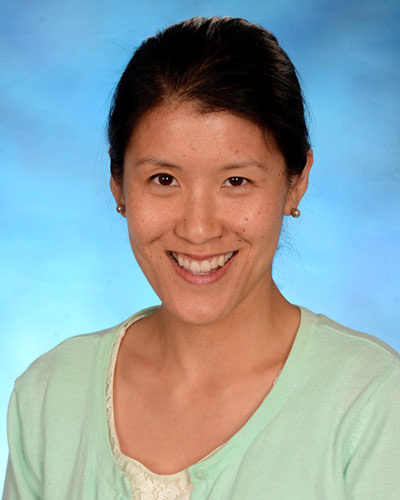$10.6M Grant Expands Funding for Abortion Clinical Care Training
A $10.6 million training grant has been awarded to the University of Maryland School of Medicine (UMSOM) and the University of Maryland, Baltimore (UMB) to administer Maryland’s Abortion Clinical Care Training Program.

Jessica K. Lee, MD
The grant will be used to expand the number of health care professionals with abortion care training, increase the racial and ethnic diversity among health care professionals with abortion care education, and support the identification of clinical sites needing training.
“Our training will target a major public health problem of abortion care training and abortion care access in our state,” said Jessica K. Lee, MD, associate professor of obstetrics, gynecology, and reproductive sciences at UMSOM and co-principal investigator on this training program. ”We will specifically address training clinicians in underserved areas and rural areas in Maryland to help reverse health inequities and to provide reproductive health care services to those in need.”
Program funds will be distributed to participating organizations, including Planned Parenthood of Maryland to operate a community-based clinical site and the National Abortion Federation to support UMB in developing the statewide training system. An additional community-based clinical site will be identified later this year. The funding period for this grant will run through June 30, 2026.
“This funding represents a major step toward fortifying reproductive rights with abortion training and education,” said Maryland Department of Health Secretary Laura Herrera Scott, MD, MPH. “These comprehensive training programs, along with Gov. Wes Moore’s additional funding to support Medicaid providers, will help keep abortion care in Maryland safe and accessible for generations.”
Abortions are safe when provided by qualified health providers. The American College of Obstetricians and Gynecologists has cited restrictions on the types of clinicians who can perform abortions as barriers to accessing services and improving care quality and safety.
Physicians, certified nurse midwives, certified nurse practitioners, and physician assistants who are interested in being notified when the training program application goes live can submit their contact information at https://forms.office.com/r/uWyxp2DNaf.
“We recognize that expanding access to reproductive health services will require a team-based approach involving multiple health professionals,” said Mary Jo Bondy, DHEd, director of graduate studies for the University of Maryland Graduate School and co-principal investigator on this training program. “Through legislative action and this funding to expand clinical training, Marylanders will be able to readily access these services in the communities where they live.”
In 2020, more than 60 percent of Maryland counties had no community-based clinics that provided abortions. Expanding the pool of clinicians who provide abortion care — particularly in communities where abortions are more difficult to access and for patient populations that experience discrimination within the health care system — is critical to improving equitable access to care across the state.
“As a woman and Marylander, I am so grateful to live in our state and work for our institution, where women’s health and women’s health education are so valued,” said Irina Burd, MD, PhD, chair of the Department of Obstetrics, Gynecology, and Reproductive Sciences at UMSOM.
Funding for the Abortion Care Clinical Training Program was established in 2022 by the Abortion Care Access Act, which helps ensure access to high-quality, safe abortion care in Maryland by providing a grant for clinical training of abortion care providers and their clinical care teams.
“I am proud that our faculty are committed to women’s health and women’s reproductive rights,” said Mark T. Gladwin, MD, who is the John Z. and Akiko K. Bowers Distinguished Professor and dean of UMSOM, and vice president for medical affairs at UMB. “We are a magnet program that empowers women and advances the training of providers focused on serving our community and improving the vitality of mothers and babies in the state of Maryland.”
About the University of Maryland School of Medicine
Now in its third century, the University of Maryland School of Medicine was chartered in 1807 as the first public medical school in the United States. It continues today as one of the fastest-growing, top-tier biomedical research enterprises in the world — with 46 academic departments, centers, institutes, and programs, and a faculty of more than 3,000 physicians, scientists, and allied health professionals, including members of the National Academy of Medicine and the National Academy of Sciences, and a distinguished two-time winner of the Albert E. Lasker Award in Medical Research. With an operating budget of more than $1.2 billion, the School of Medicine works closely in partnership with the University of Maryland Medical Center and Medical System to provide research-intensive, academic, and clinically based care for nearly 2 million patients each year. The School of Medicine has more than $500 million in extramural funding, with most of its academic departments highly ranked among all medical schools in the nation in research funding. As one of the seven professional schools that make up the University of Maryland, Baltimore campus, the School of Medicine has a total population of nearly 9,000 faculty and staff, including 2,500 students, trainees, residents, and fellows. The School of Medicine, which ranks as the eighth-highest among public medical schools in research productivity (according to the Association of American Medical Colleges profile) is an innovator in translational medicine, with 606 active patents and 52 start-up companies. In the latest U.S. News & World Report ranking of the Best Medical Schools, published in 2023, the UM School of Medicine is ranked No. 10 among the 92 public medical schools in the U.S., and in the top 16 percent (No. 32) of all 192 public and private U.S. medical schools. The School of Medicine works locally, nationally, and globally, with research and treatment facilities in 36 countries around the world. Visit medschool.umaryland.edu.



